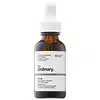What's inside
What's inside
 Key Ingredients
Key Ingredients

 Benefits
Benefits

 Concerns
Concerns

 Ingredients Side-by-side
Ingredients Side-by-side

Caprylic/Capric Triglyceride
MaskingSqualane
EmollientCrambe Abyssinica Seed Oil
Skin ConditioningBisabolol
MaskingSimmondsia Chinensis Seed Oil
EmollientEthylhexyl Stearate
EmollientIsochrysis Galbana Extract
Skin ConditioningAdansonia Digitata Seed Oil
EmollientArgania Spinosa Kernel Oil
EmollientBorago Officinalis Seed Oil
EmollientRosa Canina Seed Oil
EmollientSclerocarya Birrea Seed Oil
HumectantOenocarpus Bataua Fruit Oil
EmollientPlukenetia Volubilis Seed Oil
EmollientBertholletia Excelsa Seed Oil
EmollientSolanum Lycopersicum Fruit Extract
AntioxidantHydroxymethoxyphenyl Decanone
Skin ConditioningRosmarinus Officinalis Leaf Extract
AntimicrobialTocopherol
AntioxidantCaprylic/Capric Triglyceride, Squalane, Crambe Abyssinica Seed Oil, Bisabolol, Simmondsia Chinensis Seed Oil, Ethylhexyl Stearate, Isochrysis Galbana Extract, Adansonia Digitata Seed Oil, Argania Spinosa Kernel Oil, Borago Officinalis Seed Oil, Rosa Canina Seed Oil, Sclerocarya Birrea Seed Oil, Oenocarpus Bataua Fruit Oil, Plukenetia Volubilis Seed Oil, Bertholletia Excelsa Seed Oil, Solanum Lycopersicum Fruit Extract, Hydroxymethoxyphenyl Decanone, Rosmarinus Officinalis Leaf Extract, Tocopherol
Vitis Vinifera Seed Oil
EmollientSimmondsia Chinensis Seed Oil
EmollientPlukenetia Volubilis Seed Oil
EmollientCarthamus Tinctorius Seed Oil
MaskingMacadamia Ternifolia Seed Oil
EmollientCamellia Japonica Seed Oil
EmollientOenothera Biennis Oil
EmollientRosa Rubiginosa Seed Oil
EmollientArgania Spinosa Kernel Oil
EmollientTocopheryl Acetate
AntioxidantMel
EmollientPropolis Cera
AntiseborrhoeicVaccinium Macrocarpon Seed Oil
Skin ConditioningPunica Granatum Seed Oil
EmollientGlycine Soja Oil
EmollientTocopherol
AntioxidantPentylene Glycol
Skin ConditioningParfum
MaskingHelianthus Annuus Seed Oil
EmollientCalendula Officinalis Flower Extract
MaskingDaucus Carota Sativa Root Extract
Skin ConditioningCI 40800
Cosmetic ColorantVitis Vinifera Seed Oil, Simmondsia Chinensis Seed Oil, Plukenetia Volubilis Seed Oil, Carthamus Tinctorius Seed Oil, Macadamia Ternifolia Seed Oil, Camellia Japonica Seed Oil, Oenothera Biennis Oil, Rosa Rubiginosa Seed Oil, Argania Spinosa Kernel Oil, Tocopheryl Acetate, Mel, Propolis Cera, Vaccinium Macrocarpon Seed Oil, Punica Granatum Seed Oil, Glycine Soja Oil, Tocopherol, Pentylene Glycol, Parfum, Helianthus Annuus Seed Oil, Calendula Officinalis Flower Extract, Daucus Carota Sativa Root Extract, CI 40800
 Reviews
Reviews

Ingredients Explained
These ingredients are found in both products.
Ingredients higher up in an ingredient list are typically present in a larger amount.
You may know this ingredient as argan oil. Argan Oil has antioxidant, hydrating, and soothing properties.
Studies have shown argan oil can help fight again radical damage from the sun. This makes it effective at preventing hyperpigmentation.
Large amounts of vitamin E found in argan oil helps the skin retain water. Argan oil also contains fatty acids such as linoleic acid, oleic acid, and palmitic acid. It is also a good source of lipids.
Another benefit of argan oil is skin-soothing. It can help reduce inflammation-related skin symptoms.
Argan Oil is effective at regulating sebum production in pores. This can make it effective at treating hormonal acne.
Traditionally, argan oil was used for its antibacterial and antifungal properties. However, argan oil contains fatty acids that may make it not fungal-acne safe.
Argan Trees are native to Morocco.
Learn more about Argania Spinosa Kernel OilPlukenetia Volubilis Seed Oil is an oil and isn't fungal acne safe.
This oil comes from the seeds of the desert shrub called Jojoba. It is more commonly known as jojoba oil, a non-comedogenic oil.
Jojoba oil does not contain fragrance and has many fatty-acids, making it a great soothing ingredient.
It also contains Vitamin E, a great moisturizing ingredient. Vitamin E is also an antioxidant and protects your skin against oxidative damage.
This ingredient humectant properties, meaning it helps draw moisture from the air. This helps keep your skin hydrated.
While jojoba has antibacterial properties, it is only able to kill some strains of bacteria.
Studies also show it helps in wound healing. In fact, Indigenous cultures have used jojoba as a moisturizer and to help treat burns for centuries.
Fun fact: Jojoba oil similar to natural human skin sebum, so it has a great effect on dry skin. It is also promising with helping to regulate sebum production.
Due to its fatty acid content, Jojoba oil may not be fungal acne safe. We recommend speaking with a professional if you have any concerns.
Learn more about Simmondsia Chinensis Seed OilTocopherol (also known as Vitamin E) is a common antioxidant used to help protect the skin from free-radicals and strengthen the skin barrier. It's also fat soluble - this means our skin is great at absorbing it.
Vitamin E also helps keep your natural skin lipids healthy. Your lipid skin barrier naturally consists of lipids, ceramides, and fatty acids. Vitamin E offers extra protection for your skin’s lipid barrier, keeping your skin healthy and nourished.
Another benefit is a bit of UV protection. Vitamin E helps reduce the damage caused by UVB rays. (It should not replace your sunscreen). Combining it with Vitamin C can decrease sunburned cells and hyperpigmentation after UV exposure.
You might have noticed Vitamin E + C often paired together. This is because it is great at stabilizing Vitamin C. Using the two together helps increase the effectiveness of both ingredients.
There are often claims that Vitamin E can reduce/prevent scarring, but these claims haven't been confirmed by scientific research.
Learn more about Tocopherol